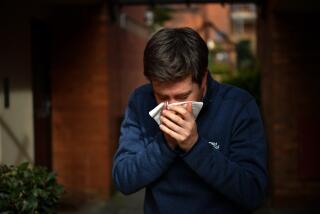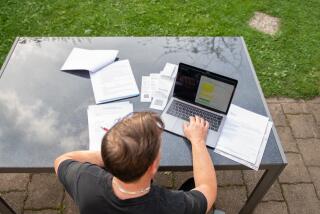Flu season could mean patients, doctors work while sick
- Share via
As influenza season continues, here’s a quick word of advice: If you’re sick, do everyone a favor and take a sick day. Don’t be the trouper who comes into work hacking and feverish, because it’s likely to expose more people to the contagion.
Sounds like common sense, in theory. But in truth, taking off work when sick, even for a bug as unforgiving as the flu, is hard to do in practice. Even doctors, ironically, have trouble with it. A study in the Scandinavian Journal of Public Health found that up to 80% of physicians surveyed said they had “worked during an illness for which they would have sick-listed their patients.” Double-standard much?
Then there’s the study in the Journal of the American Medical Assn. that found that about 58% of young doctors surveyed admitted that they had reported for work while sick at least once during the last year. Nearly a third of respondents did so more than once.
Reasons for what’s called “presenteeism” can be varied.
“Part of the problem may have been that residents simply didn’t have time to be patients – 53% said there weren’t enough hours in the day for them to see a physician. They may also have come to work because they didn’t want to look weak, dump extra work on their already overwhelmed colleagues, or because they felt that no one else could handle their particular responsibilities,” Booster Shots’ Karen Kaplan writes.
These attitudes are probably fostered by the pressure-cooker culture typical at many hospitals. Take this first-person account from Dr. Pauline Chen in the New York Times:
“I had been a third-year medical student and had asked my senior doctor-in-training if I could go home because of an upset stomach.
‘Sure, go on home,’ he replied, an impassive look on his broad face. ‘Just remember that I’ve never missed a day at the hospital in my life. They’ll have to put me in the hospital to keep me from taking care of my patients.’ ”
Yikes.
And such attitudes can have serious consequences for patients, though presenteeism is an ill-studied phenomenon whose effects are harder to pin down than its foil, absenteeism. A 2010 case study in the Journal of General Internal Medicine broke down how patients in a nursing home fell ill after health officials came down with viral gastroenteritis but kept working.
“Over the course of the next 10 days, 23 residents and 18 staff developed symptoms of nausea, vomiting and diarrhea. Laboratory studies of affected staff and residents confirmed norovirus genotype 2,” the authors wrote. “By Day 8 of the outbreak, it became increasingly clear that ill staff members continued to work despite strong recommendations to the contrary by management.”
The effects of non-health workers may or may not be quite as dire, but the moral of the story still holds: If you’re sick, do the right thing and try to keep that contagion to yourself.







